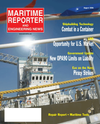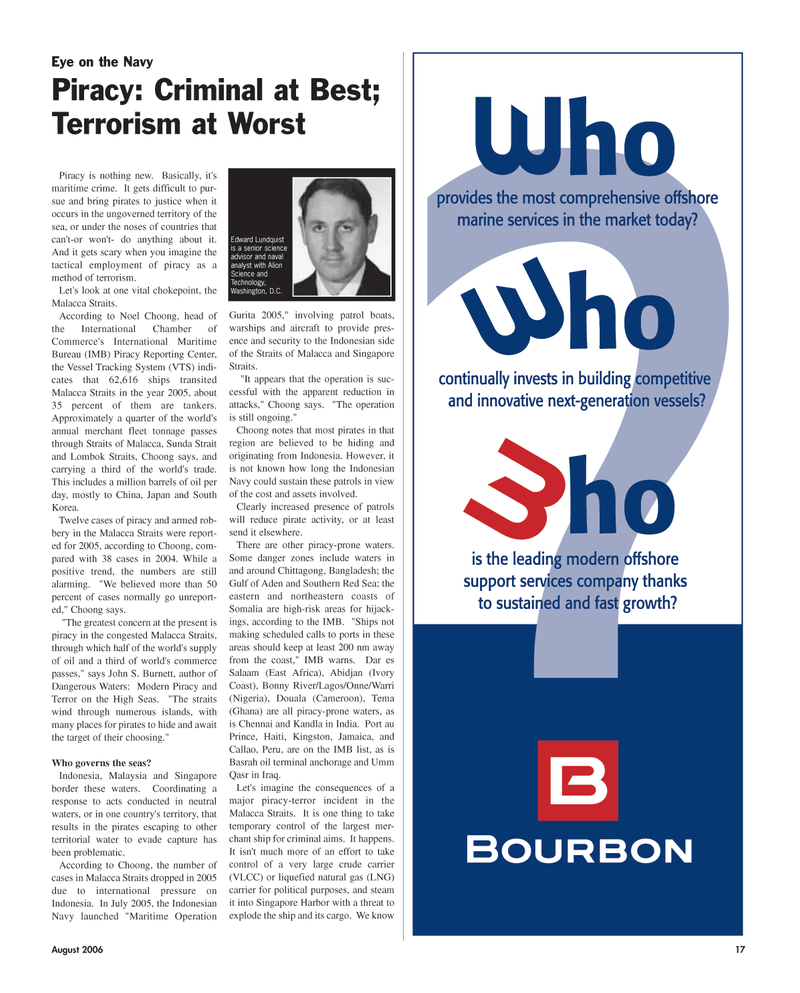
Page 17: of Maritime Reporter Magazine (August 2006)
AWO Edition: Inland & Offshore Waterways
Read this page in Pdf, Flash or Html5 edition of August 2006 Maritime Reporter Magazine
August 2006 17
Piracy is nothing new. Basically, it's maritime crime. It gets difficult to pur- sue and bring pirates to justice when it occurs in the ungoverned territory of the sea, or under the noses of countries that can't-or won't- do anything about it.
And it gets scary when you imagine the tactical employment of piracy as a method of terrorism.
Let's look at one vital chokepoint, the
Malacca Straits.
According to Noel Choong, head of the International Chamber of
Commerce's International Maritime
Bureau (IMB) Piracy Reporting Center, the Vessel Tracking System (VTS) indi- cates that 62,616 ships transited
Malacca Straits in the year 2005, about 35 percent of them are tankers.
Approximately a quarter of the world's annual merchant fleet tonnage passes through Straits of Malacca, Sunda Strait and Lombok Straits, Choong says, and carrying a third of the world's trade.
This includes a million barrels of oil per day, mostly to China, Japan and South
Korea.
Twelve cases of piracy and armed rob- bery in the Malacca Straits were report- ed for 2005, according to Choong, com- pared with 38 cases in 2004. While a positive trend, the numbers are still alarming. "We believed more than 50 percent of cases normally go unreport- ed," Choong says. "The greatest concern at the present is piracy in the congested Malacca Straits, through which half of the world's supply of oil and a third of world's commerce passes," says John S. Burnett, author of
Dangerous Waters: Modern Piracy and
Terror on the High Seas. "The straits wind through numerous islands, with many places for pirates to hide and await the target of their choosing."
Who governs the seas?
Indonesia, Malaysia and Singapore border these waters. Coordinating a response to acts conducted in neutral waters, or in one country's territory, that results in the pirates escaping to other territorial water to evade capture has been problematic.
According to Choong, the number of cases in Malacca Straits dropped in 2005 due to international pressure on
Indonesia. In July 2005, the Indonesian
Navy launched "Maritime Operation
Gurita 2005," involving patrol boats, warships and aircraft to provide pres- ence and security to the Indonesian side of the Straits of Malacca and Singapore
Straits. "It appears that the operation is suc- cessful with the apparent reduction in attacks," Choong says. "The operation is still ongoing."
Choong notes that most pirates in that region are believed to be hiding and originating from Indonesia. However, it is not known how long the Indonesian
Navy could sustain these patrols in view of the cost and assets involved.
Clearly increased presence of patrols will reduce pirate activity, or at least send it elsewhere.
There are other piracy-prone waters.
Some danger zones include waters in and around Chittagong, Bangladesh; the
Gulf of Aden and Southern Red Sea; the eastern and northeastern coasts of
Somalia are high-risk areas for hijack- ings, according to the IMB. "Ships not making scheduled calls to ports in these areas should keep at least 200 nm away from the coast," IMB warns. Dar es
Salaam (East Africa), Abidjan (Ivory
Coast), Bonny River/Lagos/Onne/Warri (Nigeria), Douala (Cameroon), Tema (Ghana) are all piracy-prone waters, as is Chennai and Kandla in India. Port au
Prince, Haiti, Kingston, Jamaica, and
Callao, Peru, are on the IMB list, as is
Basrah oil terminal anchorage and Umm
Qasr in Iraq.
Let's imagine the consequences of a major piracy-terror incident in the
Malacca Straits. It is one thing to take temporary control of the largest mer- chant ship for criminal aims. It happens.
It isn't much more of an effort to take control of a very large crude carrier (VLCC) or liquefied natural gas (LNG) carrier for political purposes, and steam it into Singapore Harbor with a threat to explode the ship and its cargo. We know
Eye on the Navy
Piracy: Criminal at Best;
Terrorism at Worst
Edward Lundquist is a senior science advisor and naval analyst with Alion
Science and
Technology,
Washington, D.C.
MR AUGUST2006 #3 (17-24).qxd 8/2/2006 5:23 PM Page 17

 16
16

 18
18
